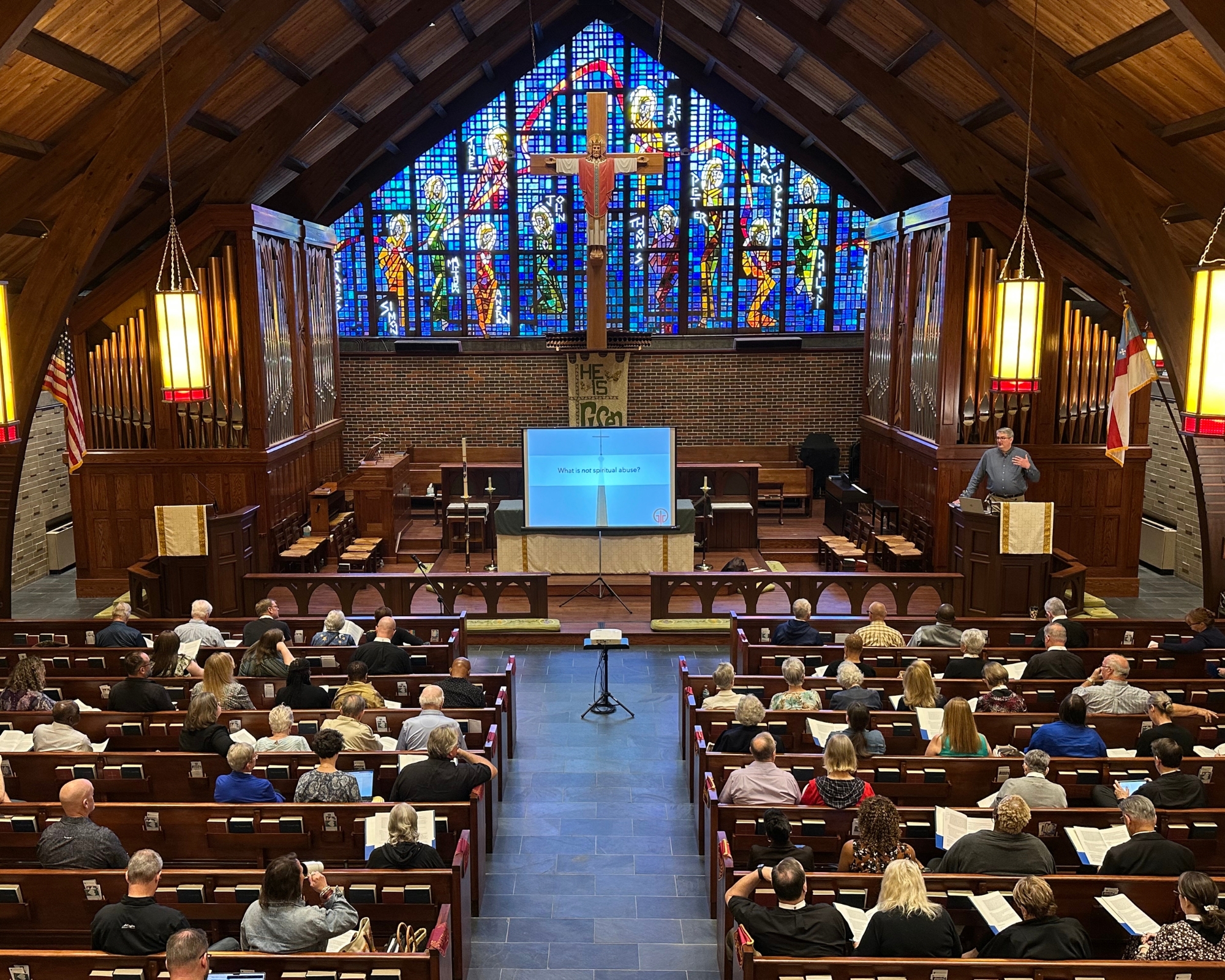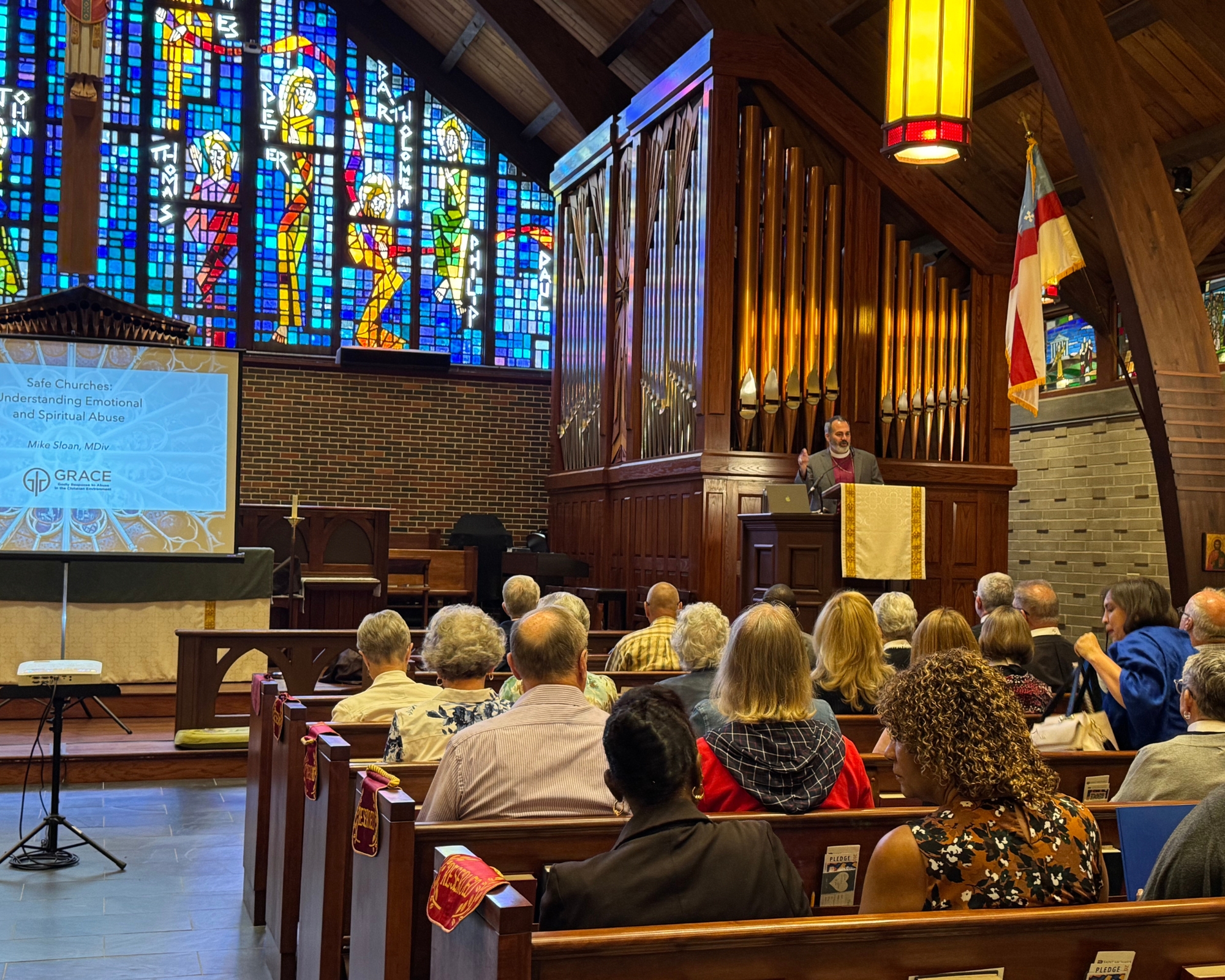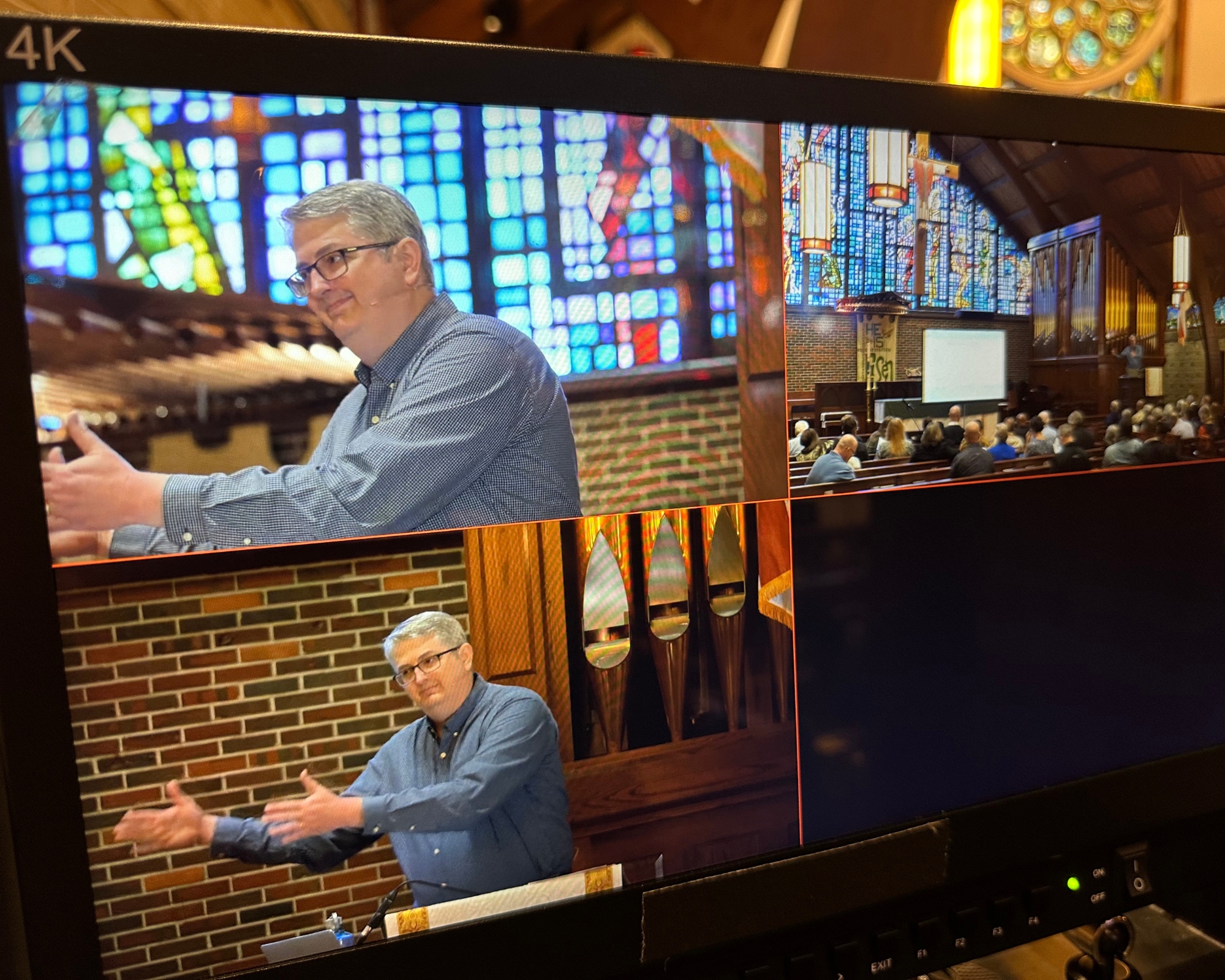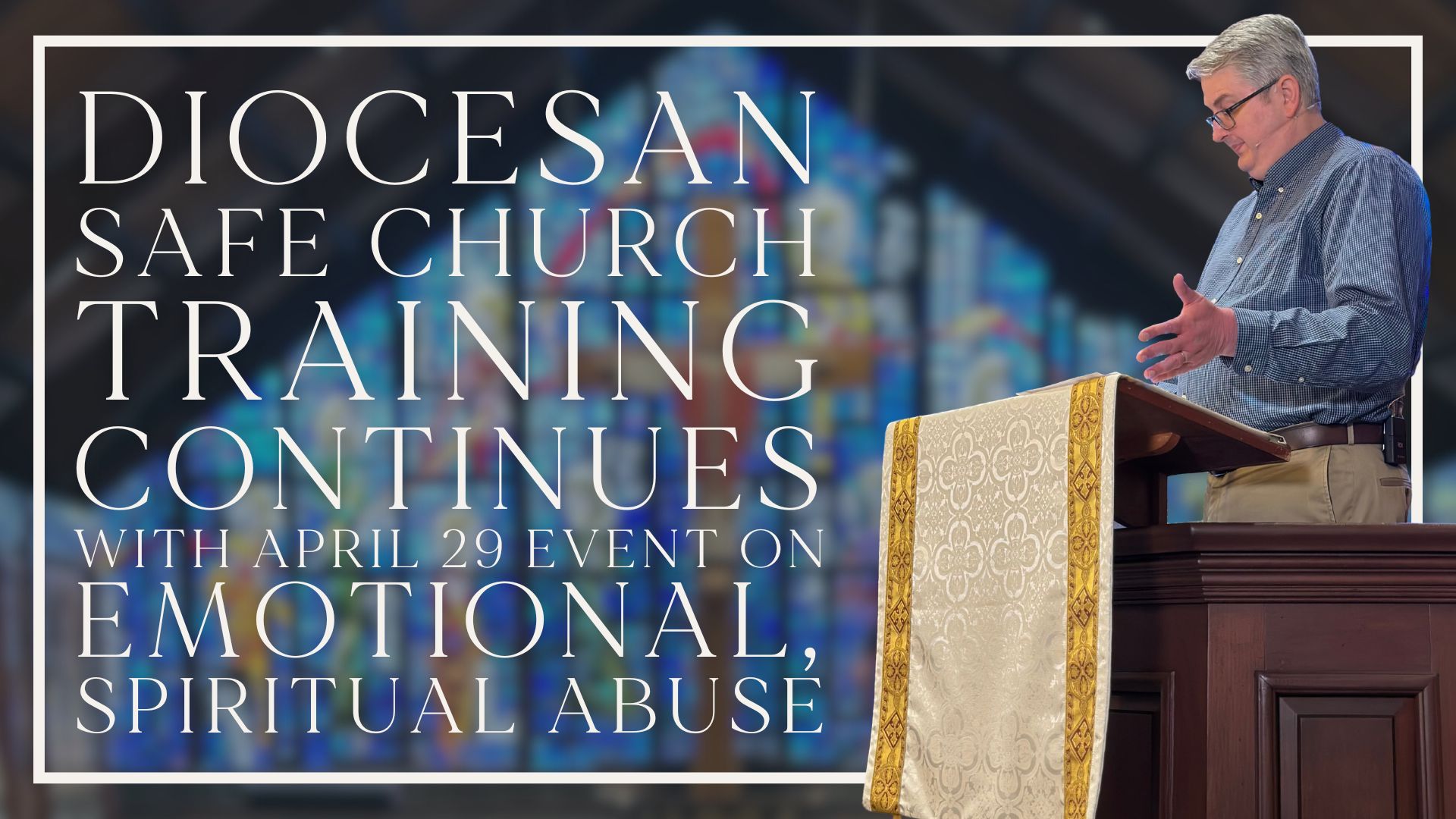The Episcopal Diocese of Central Florida continued its safe church journey on April 29 at St. Michael’s, Orlando, with the presentation of “Leading Safe Churches: Understanding Emotional and Spiritual Abuse” by the Rev. Mike Sloan, director of safeguarding for GRACE (Godly Response to Abuse in the Christian Environment). The three-session interactive training, attended by nearly 80 leaders from across the diocese, was designed to equip participants to confront the realities of emotional and spiritual abuse and to build cultures of safety, healing and trust in churches, schools and ministries.
As with the 2024 GRACE training, “Shedding Light on Abuse: Prevention and Response,” professional video recordings of each session will be made available to the deanery deans, extending the reach of the training beyond those who attended in person. This year, an electronic version of Sloan’s training handout will also be included, and deans will be encouraged to distribute the videos to their clergy so that safe church education can be conducted at the parish level. A video of Sloan’s presentation at the 2025 Diocesan Convention, “Leading Safe Churches,” is also available at this link.

The Rev. Mike Sloan introduces the topic of emotional and spiritual abuse at the April 29, 2025, safe church training. | Photo courtesy of the Diocese of Central Florida
Goals and Emphases
As the registration form for the 2025 event stressed, however, the GRACE trainings are supplemental and not intended to take the place of the “Safe Church, Safe Communities” curriculum from Praesidium, a set of online training modules, available in both English and Spanish, and required for all churches and schools in the Diocese of Central Florida. Find these modules and other information at this link; safe church administrators (one per church or school), please contact Ms. Adria Northern, anorthern@cfdiocese.org, for access. The PDF and the Course Selection Matrix at the bottom of the Praesidum page details which church staff and volunteers are required to take which modules.
“This is our second year of offering safe church training for the diocese, and it will remain a regular fixture of our yearly diocesan calendar and life,” said the Rt. Rev. Dr. Justin S. Holcomb as he introduced Sloan. “We’re going to do at least one of these every year in perpetuity – to keep the conversation going, to bring experts in to help us and serve us.”
After expressing his gratitude to the clergy and staff of St. Michael’s, the bishop told attendees, “Today we will be focusing on defining, recognizing and developing skills to prevent and respond well to emotional and spiritual abuse. Emotional and spiritual abuse are common realities, yet the very nature of [this type of abuse] obscures the understanding and recognition of them. … They can be incredibly damaging, and churches must reckon with them as we seek to build healthier church communities.”
“GRACE has talked with Bishop Holcomb about conducting all of our trainings within the diocese over the next few years,” Sloan said later. “The overall goal is to give church leaders and parishioners practical knowledge and skills so they are better able to recognize, prevent and respond to abuse. This particular training focused on emotional and spiritual abuse, both types of abuse that can be harder to recognize.”
The first session focused on defining and recognizing emotional and spiritual abuse, and the second delved deeper into the definition of spiritual abuse and gave more detail on systems – not just individuals – that are abusive. The final segment focused on the impact of spiritual abuse and how we can create healthier Christian cultures. The presentation included a closing Q&A and other opportunities to reflect, respond and interact with the material presented as well as to continue to do so after the day’s end.
“I had a wonderful seminary professor who taught us, ‘An ounce of reflection leads to a pound of learning,’ Sloan said. “I try to put that into practice so participants will come away with new knowledge and practical skills.”

Bishop Holcomb welcomes participants to the 2025 safe church training. | Photo courtesy of the Diocese of Central Florida
Reflections and Responses
“It is appalling to me that someone would use their spiritual authority as a tool to control and manipulate others to do their will,” said the Very Rev. Deke Miller, dean of the Southwest Deanery and vicar, Holy Cross, Winter Haven. “I found this training to be very helpful in seeing the signs of such abuse and to learn ways of one, avoiding being the abuser and two, helping those who have suffered from it.
“For me, awareness is the first step in prevention when it comes to abuse, especially the ‘unseen’ abuses of the emotional and spiritual,” he said. “I am thankful to Bishop Holcomb for offering these events and to Mike Sloan for the excellent training.”
Mae Winter, who serves as production manager for Resurrection Players at Church of the Resurrection, Longwood, and, prior to that, headed up Christian education for the youth of the church, was invited to attend the April 29 training by Resurrection’s safe church administrator, Jill Chester. Despite a packed schedule (Resurrection Players produced two spring shows, one held the weekend before the training and one the weekend after), Winter was happy to attend. “It was a really interesting event, and I was really excited to see that people are thinking about it and talking about it,” she said. “Spiritual abuse is a real thing, and it can just kill a church.”
“Just as a regular parishioner, I’m really glad to see our diocese dealing with this, because it’s a rapidly changing world,” she added. “And it’s great to have people in leadership who are willing, not to throw out old traditions, but not to be afraid to say, ‘OK, we have to deal with what’s in front of us. We have to deal with the culture of the people who are walking through those red doors, not just the culture that the people who walked in 20 years ago and haven’t left yet are coming from. What are younger people living in right now? What are young parents living in?’ Because we need those people.'”
Active in keeping children and young adults safe through the Resurrection Players ministry at her church, Winter offered some advice for other parishes. “The more people that you can get involved in children’s ministry, the better,” she said. “Safeguarding training shouldn’t be considered a ‘nice to have’ or ‘if you can make it.’ But there’s a fine line between, ‘Oh, I’m volunteering for something,” and ‘Wow, you just made it really hard for me to volunteer.'”
She suggested that churches make it as easy as possible for volunteers to get the safeguarding training they need, including the possibility of offering training between church services or while children are engaged in other church programs, providing child care as needed. “Most of the people who are doing children’s ministry, frankly, are parents, and they’re doing it because they want their kids to have these programs,” she said. “But if you start making it too difficult, they already have a million other things to do. … Make the training as effective as you can; make it as easy for them to say yes as possible. And of course, there’s also the online option. It’s not bad, and for some people, it’s important to offer.”
Sloan expressed his gratitude for the day of teaching and learning. “I was very encouraged by the attendance and the interaction,” he said. “So many people were ready to engage and interact over these issues. It was clear there was a heart from many people to see parishes continue to grow and step up and do more on safeguarding in all areas, including emotional and spiritual abuse. I know there were individuals who felt the training validated their past experiences, and that’s very important to me as a trainer.
“One of the tools we introduced was the tool of putting behaviors on a continuum, a spectrum from healthy to unhelpful to unhealthy to abusive, and we practice interactive exercises on how to think and categorize certain behaviors,” he explained. “And I heard from some folks that this was very helpful to have as a tool or framework. Overall, I thought the day was wonderful. I’m very grateful for the hospitality shown by the diocesan staff and the bishop and very encouraged by all of it.”

Various camera angles are seen on the monitor during the video recording of the 2025 safe church training. | Photo courtesy of the Diocese of Central Florida
“I’m grateful for all those who attended, the hours spent driving and sitting and driving back home,” Holcomb said as the training concluded. “And I’m really grateful for the spectrum Mike gave us of helpful, unhelpful, unhealthy and abusive. … that was amazing. The video we are making available from today’s teaching will bless so many of our churches going forward, so I’m grateful for that too.”
Continuing the Process
The work on safe church initiatives in the diocese is and will be an ongoing process. In the Diocese of Central Florida and in the other churches GRACE serves, “The greatest need is for leaders to continue to engage local parishes in ways that empower the whole parish to take ownership of safeguarding,” Sloan said. “This is uncomfortable, but Jesus calls us to do uncomfortable things for the sake of the least of these. … It’s really just a matter of putting in the work to take more ownership of these issues at the local level, at the parish level. And that’s difficult, because these issues are hard issues. They’re very weighty, and they require some experience and nuance and technical skill. As long as we’re making incremental progress and continuing to do this at a good pace, that’s going to make a huge difference over time.
“These are systemic issues of humans and how we relate to one another, and how certain individuals can use power in ways that are domineering and do great harm,” he continued. “Because again, they’re so systemic, and often they’re hidden, because those who do this are often able to obscure their behavior. If they were open about it, we could more easily deal with it. It takes some sustained effort and will from leadership and then engagement with the whole community in appropriate ways.
“None of that’s easy, but we understand it must be done,” Sloan said. “And again, from what I heard from people and what I saw in the heart expressed in the interactions, there is a will to see churches and parishes make progress at that local level and continue to engage in constructive ways.”
Responding to a question about reporting abuse by clergy during the Q&A that followed Sloan’s presentation, Holcomb said, “Every denomination has some strengths and weaknesses, but one of our strengths is that there’s actually a process that has some checks and balances,” referring to Title IV, “Ecclesiastical Discipline,” of The Episcopal Church. He highlighted the diocese’s two Title IV intake officers, the Rev. Canon Dr. Dan Smith, canon to the ordinary, and the Rev. Dr. Robin Reed, a licensed psychologist and rector of St. Francis of Assisi, Lake Placid, who are both authorized to receive these complaints so no one is forced to confront someone they believe has abused them, and so victims have the choice of either a male or a female intake officer.
“This is culture building,” Holcomb said of the training and its attendance of priests, deacons and laity. “This is exactly the goal, and I’m thrilled.”
The next step in the diocesan-wide safe church journey, “Safe Churches, Safe Ministry,” is scheduled for Thursday, Aug. 21, from 6:30-8:00 p.m. at St. Barnabas, DeLand, and will be led by the co-chairs of the Safe Church Commission, the Rev. Audrey Sutton, rector of St. Barnabas; and Ms. Monica Taffinder, LMHC, LMFT, co-founder of Grace Clinic Christian Counseling. The course will equip participants with practical tools and resources they can immediately apply in their churches and ministries, guiding them through a comprehensive understanding of diocesan policies and equipping them to identify red flags and recognize signs of abuse in real time. For more information and to register, visit this link.

